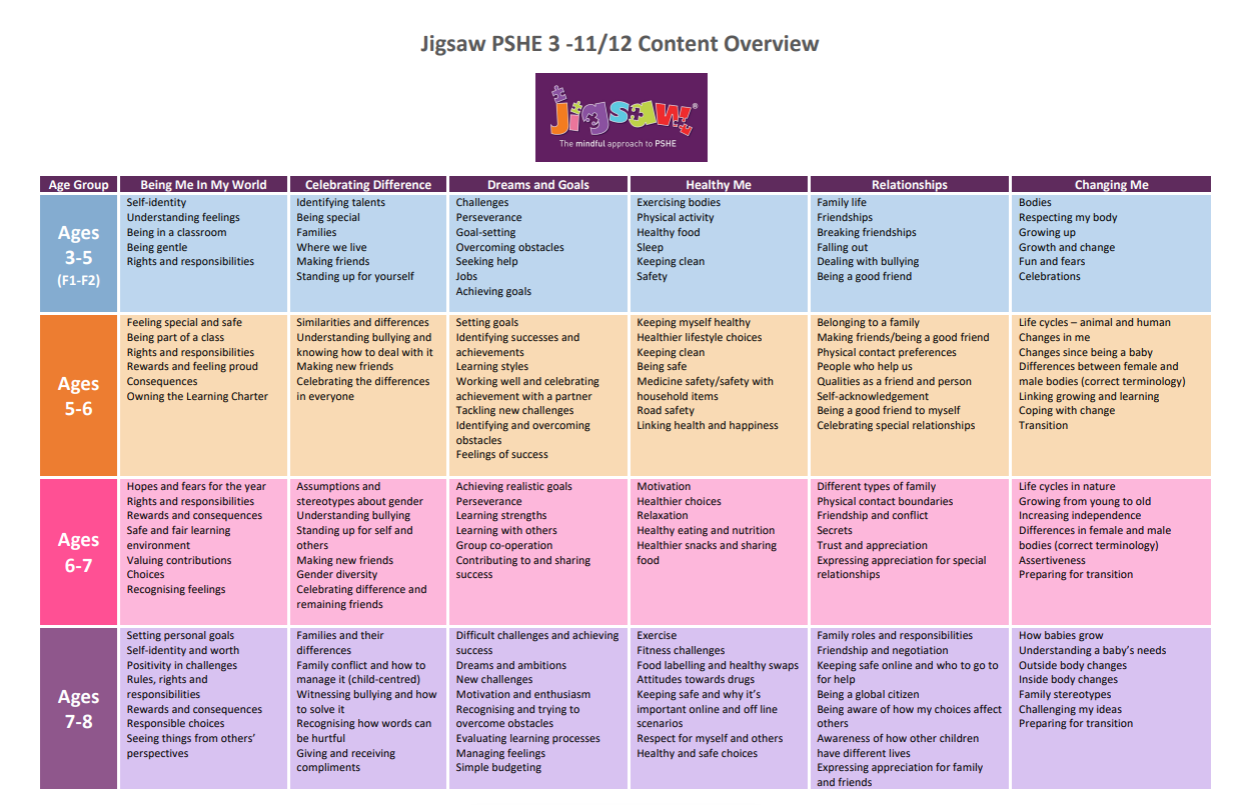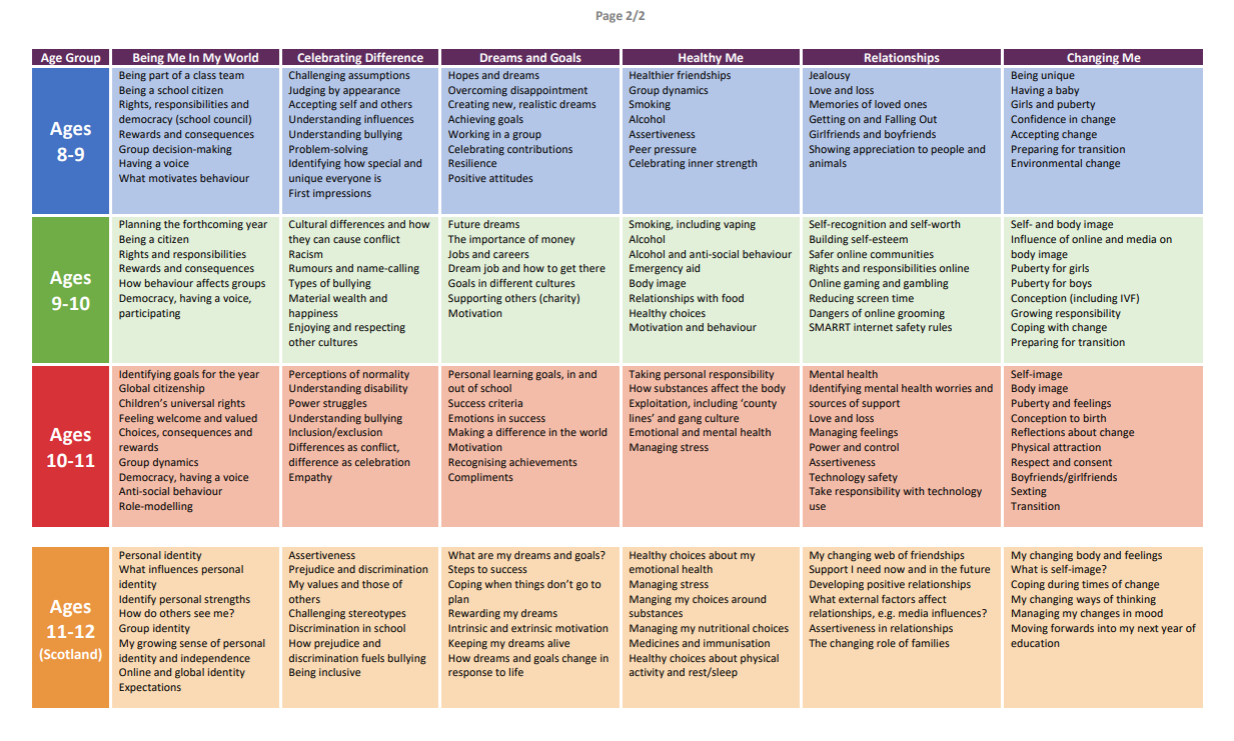Relationship, Sex and Health Education
What does Relationship Sex and Health Education (RSHE) cover?
Relationships Education in primary schools will cover ‘Families and people who care for me’, ‘Caring friendships’, ‘Respectful relationships’, ‘Online relationships’, and ‘Being safe’.
The new guidance states that by the end of primary school all children should know: ‘how to report concerns or abuse, and the vocabulary and confidence needed to do so’.
The new guidance states that Relationships Education should promote equal, safe and enjoyable relationships and be taught in a way which fosters LGBT and gender equality, in line with the Equalities Act 2010.
The Sex Education Forum define Relationships and Sex Education (RSE) as learning about the emotional, social and physical aspects of growing up, relationships, sex, human sexuality and sexual health. It should equip children and young people with the information, skills and positive values to have safe, fulfilling relationships, to enjoy their sexuality and to take responsibility for their sexual health and well-being.
"The right to education includes the right to sexual education, which is both a human right in itself and an indispensable means of realising other human rights, such as the right to health, the right to information and sexual and reproductive rights."
Report to the UN General Assembly - July 2010 | Item 69, paragraph 1
The vast majority of the RSE Curriculum is essential, however, there are some elements which parents/guardians have a right to opt out of. Please read this letter for further details:
RSE opt out letter for parents
Dear Parents/Carers,
At Lickhill Primary School we use Jigsaw, the mindful approach to PSHE, as our scheme of work to teach PSHE (Personal, Social, Health Education). The programme consists of 6 half-term units, each with 6 lessons. We call these Jigsaw ‘Puzzles’. (Being Me in My World, Celebrating Difference, Dreams and Goals, Healthy Me, Relationships and Changing Me).
In the second half of the Summer Term we will be teaching the ‘Changing Me’ Puzzle. This helps children learn to cope positively with all sorts of change. In Key Stage 2 they will learn about puberty in this Puzzle. In Key Stage 1 we introduce scientific terminology for body parts, including genitalia, partly for safeguarding reasons and partly to lay the foundations for learning about puberty later.
The purpose of this letter is to inform you of the statutory requirements placed on schools, and what we plan to teach when for this topic in PSHE this term.
The government statutory guidance gives parents the right to request to withdraw their child from Sex Education, and this letter explains more about what Sex Education is and how you can find out more about this if you wish to.
Health, Relationship and Sex Education
Health and Relationship Education is statutory in all primary schools, and it is recommended that all primary schools have a Sex Education programme that is tailored to the age of the pupils.
The Health and Relationship curriculum content is woven throughout the entire programme of Jigsaw, with a specific focus within the ‘Healthy Me’ and ‘Relationships’ Puzzles.
In the Early Years and Key Stage 1, the focus is on life cycles, valuing our own bodies and learning some vocabulary for the external body parts, that we might use if we needed to talk to an adult such as a nurse or a doctor.
In Key Stage 2,there is a particular focus on the Health Education element of puberty in (including menstruation) and the changes that happen inside and outside the body. This is taught in a way that helps pupils feel prepared for the main changes that happen before puberty starts, and to encourage them to talk to an adult at home or at school if they have any questions.
The right to withdraw
As parents you have the right to withdraw your child from the non-statutory elements of our teaching. These will be the lessons on human reproduction. You are unable to withdraw your child from any lessons within Relationship or Health Education (this includes puberty and menstruation). If you do wish to withdraw your child from the human reproduction lessons, please contact Mrs Lloyd so we can discuss the implications this.
What will my child be taught about puberty and human reproduction?
The Jigsaw unit ‘Changing Me’ is taught in the Summer Term and contains 6 pieces (lessons). Each year group will be taught appropriate to their age and developmental stage. This content will be taught by the class/year teachers. We will not teach beyond the remit of the year group. If questions are asked that the teacher feels are inappropriate or are beyond the content for that year group, the teacher may ask the child to ask their parent/carer, or the teacher may acknowledge the question and explain that we will learn about that aspect at another time.
The table below only covers the lessons (pieces) that relate to life cycles, the human body, puberty, and human reproduction. The lessons (pieces) in Years 4,5 and 6 that parents can withdraw their children from are highlighted in bold font.
|
Year group |
Piece (lesson) Number and Name |
Learning Intentions relating to Puberty and Human Reproduction |
|
|
|
|
|
Ages 4-5 Reception |
Piece 1- My Body |
|
|
|
Piece 3 – Growing Up |
|
|
Ages 5-6 Year 1 |
Piece 1 Life Cycles |
|
|
|
Piece 2 Changing Me |
|
|
|
Piece 3 My Changing Body |
|
|
|
Piece 4 Boys’ and Girls’ Bodies |
|
|
Ages 6-7 Year 2 |
Piece 1 Life Cycles in Nature |
|
|
|
Piece 2 Growing from Young to Old |
|
|
|
Piece 3 The Changing Me |
|
|
|
Piece 4 Boys’ and Girls’ Bodies |
|
|
Ages 7-8 Year 3
|
Piece 1 How Babies Grow |
|
|
Piece 2 Babies |
|
|
|
Piece 3 Outside Body Changes |
|
|
|
Piece 4 Inside Body Changes |
|
|
|
Ages 8-9 Year 4 |
Piece 1 Unique Me |
|
|
|
Piece 2 Having A Baby Parents have the right to withdraw children from this session as it is classed as human reproduction.
|
|
|
|
Piece 3 Puberty and Menstruation |
|
|
Age 9-10 Year 5
|
Piece 2 Puberty for Girls
|
|
|
Piece 3 Puberty for Boys
|
|
|
|
Piece 4 Conception Parents have the right to withdraw children from this session as it is classed as human reproduction. |
|
|
|
Age 10-11 Year 6
|
Piece 2 Puberty |
|
|
Piece 3 Babies – Conception to Birth Parents have the right to withdraw children from this session as it is classed as human reproduction. |
|
|
|
Piece 4 Attraction
|
|
We are eager to work in partnership with parents so please get in touch if you would like to discuss this further.
Please be aware that your child may ask you questions about what they have learnt. There is a leaflet attached to this email which gives tips on how to talk to your child about puberty and human reproduction. There is also the Usborne series of growing up books
(https://usborne.com/gb/books/series/growing-up) that you might find useful.
We hope that the information we have provided is useful in understanding what your child will be learning this term.
If you have any further questions, please contact the school office.
Jigsaw content overview


How does Jigsaw cover the RSHE curriculum?
| Pupils Should Know... | How Jigsaw provides the solution | |
|---|---|---|
| Families and people who care for me |
|
All of these aspects are covered in lessons within the Puzzles
|
| Online Relationships |
|
All of these aspects are covered in lessons within the Puzzles
|
| Being Safe |
|
All of these aspects are covered in lessons within the Puzzles
|
If you have any further questions about our RSE offer, please email the school office.

